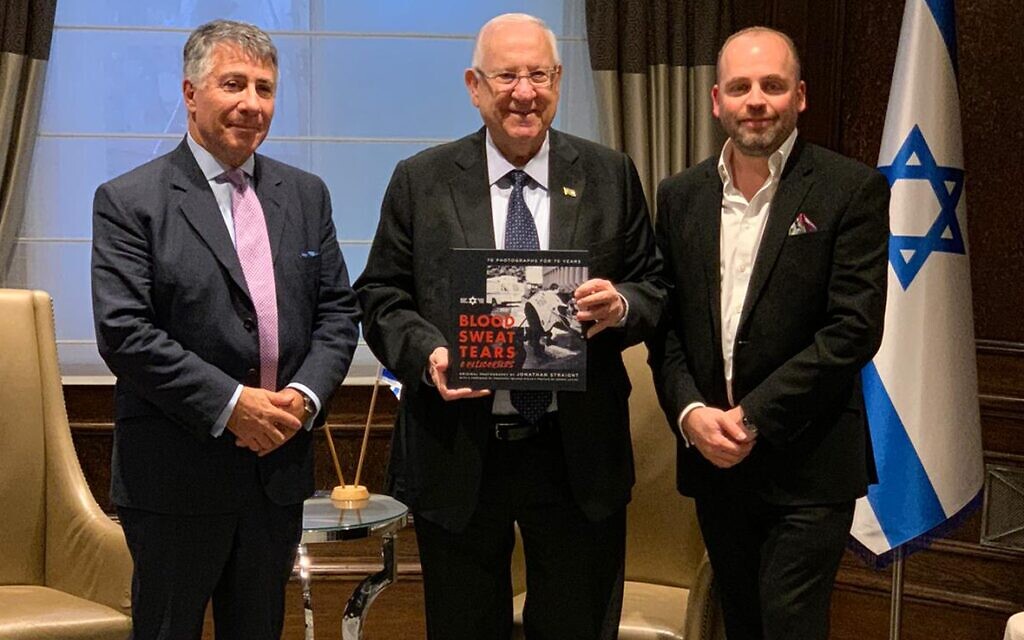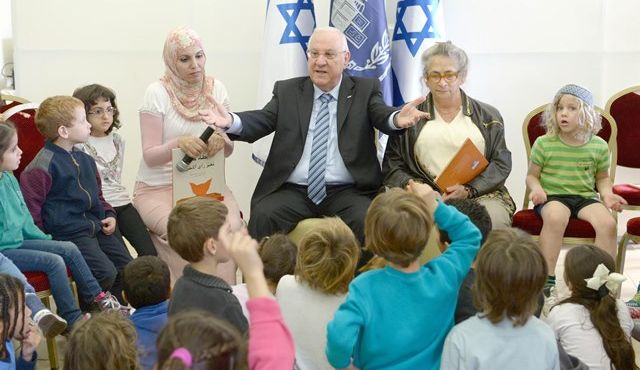President Rivlin makes flying London visit with focus on Israel’s ‘four tribes’
Head of state travelled to the UK to discuss how charitable groups can help improve the lives of Israel's Arab, Bedouin, Druze and Charedi communities

Israeli president Reuven Rivlin made a flying visit to London this week under the auspices of the Portland Trust and Yad Hanadiv, the charitable arm of the Rothschild family.
On the agenda were in-depth discussions expanding on President Rivlin’s detailed analysis of the “four tribes” of Israel society — the secular, the strictly Orthodox, the modern Orthodox and the Arab citizens.
“We are not doomed to live with each other, but destined”, the president said, but added that there were “critical” challenges which Israel faced in closing the gaps between the different groups. Israel, he said, was a success story, which had grown from a developing country to “a world innovator. It is a miracle. But now we need another, to build trust among all sectors of Israeli society and to offer the promise of economic mobility for every citizen.”
Get The Jewish News Daily Edition by email and never miss our top stories Free Sign Up
The president’s audience at Spencer House, the 18th century central London townhouse leased by Lord Rothschild, represented a part of the Jewish community largely unfamiliar to mainstream Anglo-Jewry
For the Portland Trust, Yad Hanadiv, and other philanthropists present, specialise in improving lives in the Arab, Bedouin, Druze and Charedi communities, using what is known as “impact investment”.
Sir Ronald Cohen, chair of the Portland Trust, said the overall aim was “to help those who have been left behind: our goal is to improve the lives of people on both sides of the divide.” He said that working with the President’s office, he and his colleagues “see the opportunity to work with you and tackle the next miracle, to transform Israeli society from an agricultural to a technological economy.”

Doug Krikler, the Portland Trust’s chief executive, outlined some of the imaginative work being undertaken in Israel. The projects range from improving maths results — and, ultimately, long-term employment prospects — in the Bedouin town of Rahat, to establishing “social bonds” to deal with high levels of diabetes in the Palestinian community.
The Trust has significantly improved employment possibilities for religious Druze women, who have previously, because of tradition and religious practice, been unable to leave their villages once they have graduated, although they are well educated. Instead it has been made possible for them to work remotely in Israeli hi-tech, earning vastly better salaries than in the kind of jobs usually available.
And, together with the Hebrew University, the Trust has established a three year degree course for Charedi men, destining them for “elite, hi-tech employment”.
Louise Jacobs, chair of UJIA, spoke about the impact and community philanthropy which has now become a hallmark of the charity’s work.
Dame Vivien Duffield, chair of the Clore Duffield Foundation, asked President Rivlin how he hoped to make Jewish and Arab children communicate when the language teaching of Hebrew for Arab pupils and Arab for Israeli students was so “appalling”. Mr Rivlin acknowledged that things had changed considerably since he was taught Arabic as a child. “It’s a real tragedy and we have to talk to each other”, he said, though he believed that more Arabs spoke basic Hebrew than Israelis who speak basic Arabic.
Though Mr Rivlin made it clear that as president he does not get involved in politics, he made oblique reference to the corruption charges brought against Prime Minister Netanyahu, saying it was “not the first time that a leader has been indicted, but we have to respect the rule of law”.
And he raised smiles all round when, wryly referring to the prospect of yet another general election, he observed: “We don’t need so much democracy!”
Among those present at the Spencer House event, hosted by Lord Rothschild, were the chairs and trustees of a number of charitable foundations, including the Max Barney Foundation, Yad Hanadiv, the Kirsh Foundation and the Bloom Foundation. Also present were business leaders and investors from a number of UK companies, together with the chair of the Court of the Bank of England, Bradley Fried.
Mr Rivlin held a meeting with leaders of British Magen David Adom on Wednesday before his return to Israel.

Thank you for helping to make Jewish News the leading source of news and opinion for the UK Jewish community. Today we're asking for your invaluable help to continue putting our community first in everything we do.
For as little as £5 a month you can help sustain the vital work we do in celebrating and standing up for Jewish life in Britain.
Jewish News holds our community together and keeps us connected. Like a synagogue, it’s where people turn to feel part of something bigger. It also proudly shows the rest of Britain the vibrancy and rich culture of modern Jewish life.
You can make a quick and easy one-off or monthly contribution of £5, £10, £20 or any other sum you’re comfortable with.
100% of your donation will help us continue celebrating our community, in all its dynamic diversity...
Engaging
Being a community platform means so much more than producing a newspaper and website. One of our proudest roles is media partnering with our invaluable charities to amplify the outstanding work they do to help us all.
Celebrating
There’s no shortage of oys in the world but Jewish News takes every opportunity to celebrate the joys too, through projects like Night of Heroes, 40 Under 40 and other compelling countdowns that make the community kvell with pride.
Pioneering
In the first collaboration between media outlets from different faiths, Jewish News worked with British Muslim TV and Church Times to produce a list of young activists leading the way on interfaith understanding.
Campaigning
Royal Mail issued a stamp honouring Holocaust hero Sir Nicholas Winton after a Jewish News campaign attracted more than 100,000 backers. Jewish Newsalso produces special editions of the paper highlighting pressing issues including mental health and Holocaust remembrance.
Easy access
In an age when news is readily accessible, Jewish News provides high-quality content free online and offline, removing any financial barriers to connecting people.
Voice of our community to wider society
The Jewish News team regularly appears on TV, radio and on the pages of the national press to comment on stories about the Jewish community. Easy access to the paper on the streets of London also means Jewish News provides an invaluable window into the community for the country at large.
We hope you agree all this is worth preserving.
-
By Brigit Grant
-
By Laurent Vaughan - Senior Associate (Bishop & Sewell Solicitors)
-
By Laurent Vaughan - Senior Associate (Bishop & Sewell Solicitors)
-
By Laurent Vaughan - Senior Associate (Bishop & Sewell Solicitors)
-
By Laurent Vaughan - Senior Associate (Bishop & Sewell Solicitors)






















